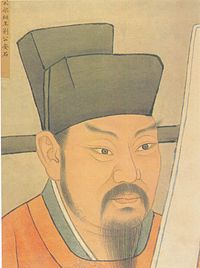Wang Anshi
| Names | |
|---|---|

| |
| Xìng 姓: | Wáng 王 |
| Míng 名: | Ānshí 安石 |
| Zì 字: | Jièfǔ 介甫 |
| Hào 號: | Bànshān Lǎorén 半山老人 |
| Shì 謚: | Wén 文¹ |
| title: | Jīngguógōng 荊國公² |
| 1. hence referred to as Wáng Wéngōng 王文公 | |
| 2. hence referred to as Wáng Jīnggōng 王荊公 | |
Wang Anshi (Chinese: 王安石; pinyin: Wáng Ānshí; Wade–Giles: Wang An-shih; 1021 - May 21, 1086 [1]) was a Chinese economist, statesman, chancellor and poet of the Song Dynasty who attempted some controversial, major socioeconomic reforms. These reforms constituted the core concepts and motives of the Reformists, while their nemesis, Chancellor Sima Guang, led the Conservative faction against them.
Background
Under the Song Dynasty, the unprecedented development of large estates, whose owners managed to evade paying their share of taxes, resulted in an increasingly heavy burden of taxation falling on the peasantry. The drop in state revenues, a succession of budget deficits, and widespread inflation prompted the Emperor Shenzong of Song to seek advice from Wang.
Early career
Though Wang was from the south, he came from a family of jinshi degree winners. He himself placed fourth in the palace degree exams in 1042. He spent the first twenty years of his career in regional government in the Lower Yangtze region. During this time, he gained practical experience in meeting the needs of the common people. This experience guided his analysis in formulating solutions to what ailed Song society. [2]
Major Reform

Wang believed that the state was responsible for providing its citizens the essentials for a decent living standard: "The state should take the entire management of commerce, industry, and agriculture into its own hands, with a view to succoring the working classes and preventing them from being ground into the dust by the rich." [citation needed]
Wang came to power in 1069. It was here that he formulated and promulgated New Policies (xin fa 新法). His reforms were classified into three groups: 1) state finance and trade, 2) defense and social order, and 3) education and improving of governance. Some of the finance reforms included paying cash for labor in place of corvee labor, increase the minting of copper coins, improve management of trade, implementing plans to lend farmers money when they planted to be repaid at harvest. He believed that the common people and their well being were the key to the strength of the state and thus he made it a priority to address their needs. [3] To destroy speculation and break up the monopolies, he also initiated a system of fixed commodity prices; and he appointed boards to regulate wages and plan pensions for the aged and unemployed.
A centerpiece of defense and social order reforms was the institution of the baojia system of organizing households. This was done to ensure collective responsibility in society and was later used to strengthen local defense. He also proposed the creation of systems to breed military horses, the more efficient manufacture of weapons and training of the militia. [4]
To improve education and government, he sought to break down the barrier between clerical and official careers as well as improving their supervision to prevent connections being used for personal gain. Tests in law, military affairs and medicine were added to the examination system, with mathematics added in 1104. The National Academy was transformed into a real school rather than simply a holding place for officials waiting for appointments. However, there was deep-seated resistance to the education reforms as it hurt bureaucrats coming in under the old system [5]
Modern observers have noted how remarkably close his theories were to modern concepts of the welfare state and planned economy. [citation needed]
Wang’s Downfall
Although Wang had the alliance of such prominent court figures as Shen Kuo, imperial scholar-officials such as Su Dongpo and Ouyang Xiu bitterly opposed these reforms on the grounds of tradition. They believed Wang's reforms were against the moral fundamentals of the Two Emperors and would therefore prevent the Song from experiencing the prosperity and peace of the ancients. The tide tilted in favor of the conservatives due to renewed foreign conflict. He was even temporarily removed from power and imprisoned in 1075. [citation needed]
Like many Chinese officials of the era, he had an up and down career, but the beginning of the end came in 1074. A famine in northern China drove many farmers off their lands. Their circumstances were made worse by the debts they had incurred from the seasonal loans granted under Wang’s reform initiatives. The situation was made even worse when local officials insisted on collecting on the loans as the farmers were leaving their land. This crisis was depicted as being Wang’s fault. The empress dowager was also an opponent of Wang. Wang wanted to resign, but the emperor still supported him, giving him high honors and an appointment to Jiangning (present-day Nanjing.)
He was recalled by the emperor the following year, but now he was seen as vulnerable and was openly attacked from groups of conservatives. Wang returned to Nanjing, which be preferred to Kaifeng. He wrote and engaged in scholarship through to his death in 1086. [6]
With Shenzhong's death in 1085, Wang was permanently ousted and the New Policies rolled back.
Poet
In addition to his political achievements, Wang Anshi was a noted poet. He wrote poems in the shi form, modelled on those of Du Fu. He was traditionally classed as one of the Eight Great Prose Masters of the Tang and Song (唐宋八大家).
Work Cited
Mote, F.W. (1999). Imperial China: 900-1800. Harvard University Press. p. 122, 138-142.
References
See also
Further reading
Anderson, Gregory E., "To Change China: A Tale of Three Reformers", Asia Pacific: Perspectives, 1:1 (2001).
